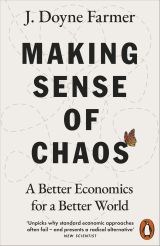Making Sense of Chaos
A Better Economics for a Better World

|
vyprodáno |
|
Internetová cena:
|
279,00 Kč 
|
|
Běžná cena:
|
349,00 Kč |
|
Zboží není skladem
|
‘Doyne Farmer is the world's leading thinker on technological change. For decades he has focused on the question of how we can make sense of the data of today to see where the world is going tomorrow. This wonderful book applies these insights to economics, addressing the big global issues of environmental sustainability, and the well-being and prosperity of people around the world’ Max Roser, Founder of Our World in Data
We live in an age of increasing complexity, where accelerating technology and global interconnection hold more promise – and more peril – than any other time in human history. As well as financial crises, issues around climate change, automation, growing inequality and polarization are all rooted in the economy, yet standard economic predictions fail us.
Many books have been written about Doyne Farmer and his pioneering work in chaos and complexity theory. Making Sense of Chaos is the first in his own words, presenting a manifesto for doing economics better. In a tale of science and ideas, Farmer fuses his profound knowledge with stories from his life to explain how to harness a scientific revolution to address the economic conundrums facing society.
Using big data and ever more powerful computers, we can for the first time apply complex systems science to economic activity, building realistic models of the global economy. The resulting simulations and the emergent behaviour we observe form the cornerstone of complexity economics. This new science, Farmer shows, will allow us to test ideas and make significantly better economic predictions – and, ultimately, create a better world.
Review
The man reinventing economics with chaos theory and complexity science ― New Scientist
Farmer convincingly argues that by using big data and today’s more powerful computers, we can build more realistic models and simulations of the global economy . . . [His] vision will undoubtedly be significant in how economics evolves -- Tej Parikh ― Financial Times, 'Best New Books on Economics'
Both a manifesto for a revolution in economics and a memoir of an unusual career -- Ed Ballard ― Wall Street Journal
Remarkable book pulling together chaos theory and economics. Provides the first possibility that economics could become a real science -- Brian Clegg ― Popular Science book reviews
Doyne Farmer is the world's leading thinker on technological change. For decades he has focused on the question of how we can make sense of the data of today to see where the world is going tomorrow. This wonderful book applies these insights to economics, addressing the big global issues of environmental sustainability, and the well-being and prosperity of people around the world -- Max Roser, Founder of Our World in Data
Farmer is navigating a third economic way between the scylla of traditional free market economics and the charybdis of de-growth economics. Seriously smart stuff from one of the world’s brainiest men -- Andrew Keen ― Keen On podcast
Farmer, a leading expert on complexity economics at Oxford University, [argues] we can and must be more radical. . . . With greater investment, he says, far more progress in understanding the economy could be made -- Martin Wolf ― Financial Times, 'Best summer books of 2024: Economics'
This book is a real achievement from which I learned a great deal. The economics profession should be much more open to Farmer type complexity approaches. I hope this book is an inspiration to young scholars from many disciplines concerned with economic questions -- Lawrence Summers, former US Secretary of the Treasury
After 2008, everybody except conventional economists seemed to realise that conventional economics is failing us. I applaud this bold and exciting new approach, born out of the 21st century rather than the 19th. It’s about time! -- Brian Eno
In this riveting book, Doyne Farmer profoundly unravels the role played by complex systems in our economy. From the time he was living in a tent while working on climate models on the American west, to his more recent years in the hallowed halls of Oxford University, Farmer’s lifelong journey is a testament to the creativity and perseverance needed to succeed in the rugged landscapes of multidisciplinary science -- César Hidalgo, author of Why Information Grows
About the Author
J. Doyne Farmer is an American complex systems scientist and entrepreneur who was a pioneer in many of the fields that define the scientific agenda of our times: dynamical systems, chaos, complex systems, artificial life, wearable computing, time series analysis, theoretical biology, and the theory of prediction. Currently he is Director of the Complexity Economics programme at the Institute for New Economic Thinking at the Oxford Martin School, Baillie Gifford Professor of Complex Systems Science in the school of Geography and the Environment at the University of Oxford, Senior Associate Research Fellow at Christ Church College, Chief Scientist at Macrocosm, and an External Professor at the Santa Fe Institute.
Previously, he was an Oppenheimer Fellow and the founder of the Complex Systems Group at Los Alamos National Laboratory. While a graduate student he led a cooperative calling itself Eudaemonic Enterprises who built the first wearable (and concealed) digital computer and used it in casinos, successfully beating the house. He was a founder of Prediction Company, an early quantitative automated trading firm that was sold to the United Bank of Switzerland in 2006. His current research is in economics, including agent-based modeling, financial instability and technological progress, and a founder of Macrocosm, a new company using complexity economics to guide the green energy transition. As an adventurer and avid sailor, Doyne also finds time to enjoy sailing his boat Eudemon.
Další knihy od tohoto autora
Diskuze
Žádný příspěvek do diskuze. Přidejte svůj názor »
|








